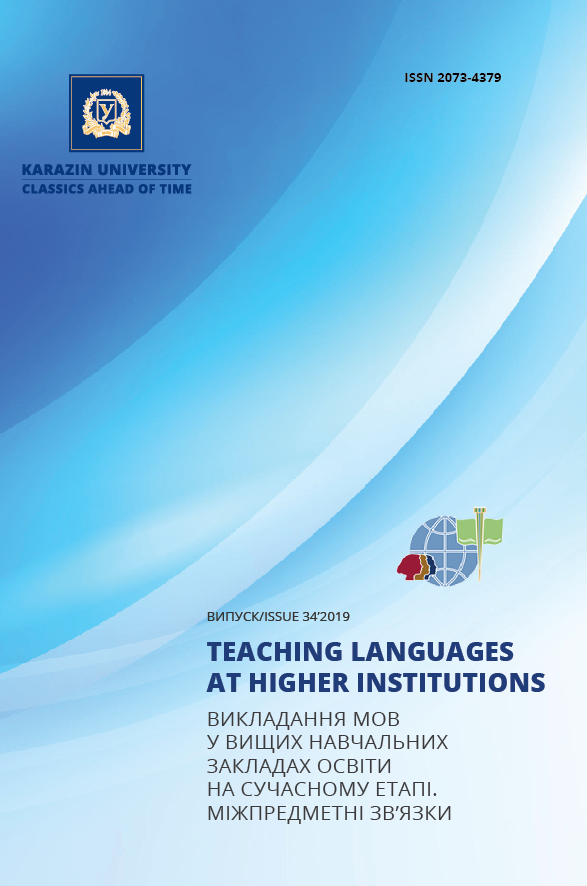Usage of the V. Dahl’s linguocultural diversity in the process of teaching Russian language to foreign students at the initial stage
Abstract
The article describes the main directions of linguistic work in the process of teaching Russian as a foreign language on the basis of V. Dahl’s linguistic and cultural dichology. At the present time, “The Explanatory Dictionary of the Great Living Russian Language” and “Proverbs of the Russian People” remain the most important scientific lexicographic and folklore by the means of enriching the lexical reserve of foreign students, as well as enriching their spiritual and moral education and the development of personal creative potential.
In Russian as a foreign language classes at level A 1, as exercises in phonetics and for pronunciation, we offer tongue twisters from the collection of V. Dahl’s proverbs, and folklore texts are given without semantization.
Paremiological material is used during the study of grammatical topics (as illustrative material) and for the development of students' speech. The use of proverbs and sayings during the Russian language classes contributes to the development of students' language intuition, helps to develop a serious and responsible attitude to the word, not only as a means of communication but also as a complex mechanism of influence on the listener, on his mental state. The linguistic personality, along with mastering the lexical minimum, the development of skills and abilities to use lexical material following the grammatical and syntactic structures of the language, masters the concepts of the culture of another society. Systematic work with paremias expands the lexical reserve of foreigners, revives their speech.
Appeal to the Explanatory Dictionary by V. Dahl is associated with the work on nonequivalent vocabulary in the course of literature. The teacher’s choice of vocabulary volume, illustrative material, and principles of adaptation of the Dahl’s vocabulary “nest” for use in classes with foreigners in each case depends on the level of the group, the plan of the leson and the time allotted by the teacher to work with lexical material and lexicographic works.
Downloads
References
Aleksandrova, V.M. and Bondar, L.A. (2011). Literatura [Literature]. K.: Izd.-poligr. centr “Kievsk. un-t” [in Russian].
Bespalenko, V.V. (2015). Russkij jazyk kak inostrannyj. Vvodno-grammaticheskij kurs [Russian as a foreign language. Introduction and grammar course]. K.: IPC “Kievskij universitet” [in Russian].
Bespalenko, V.V. (2010). Russkij jazyk kak inostrannyj: Leksiko-grammaticheskij kurs [Russian as a foreign language: lexico-grammatical course]. K.: IPC “Kievskij universitet” [in Russian].
Dahl, V.I. (1989). Poslovicy russkogo naroda [Proverbs of the Russian people]. M.: Hudozh. lit. [in Russian].
Dahl, V.I. (2003). Tolkovyj slovar' zhivogo velikorusskogo jazyka. Sovremennoe napisanie [Explanatory dictionary of the living Great Russian language. Modern writing]. M.: Astrel': AST [in Russian].
Dahl, V.I. (2007). Bol'shoj illjustrirovannyj tolkovyj slovar' russkogo jazyka. Sovremennoe napisanie [Large illustrated dictionary of the Russian language. Modern writing]. M.: Astrel': AST: Hranitel' [in Russian].
Dahl, V.I. (2008). Illjustrirovannyj tolkovyj slovar' dlja detej i shkol'nikov [Illustrated dictionary for Children and Schoolchildren]. M.: Veche [in Russian].
Mishhenko, T.N. and Rjannel, T.Ja. (2008). O roli frazeologicheskih i aforisticheskih edinic russkogo jazyka v razvitii inostrannyh studentov [On the role of phraseological and aphoristic units of the Russian language in the development of foreign students]. Vladimir Dahl kak issledovatel i tvorcheskaja lichnost [Vladimir Dal as a researcher and creative person]. Lugansk: Izd-vo VNU im. V. Dalja, pp. 127–132 [in Russian].
Mishhenko, T.N. and Rjannel T.Ja. (2007). Rol nacional'no-kul'turnogo komponenta semantiki poslovic i pogovorok pri obuchenii russkomu jazyku inostrannyh studentov [The role of the national-cultural component of the semantics of proverbs and sayings in teaching Russian to foreign students]. Nauchnoe i tvorcheskoe nasledie V.I. Dalja v kontekste sovremennogo znanija [The scientific and creative heritage of V.I. Dahl in the context of modern knowledge]. Lugansk: Izd-vo VNU, pp. 59–66 [in Russian].
Pishem mini-sochinenie o poslovicah [We write a mini-essay on proverbs]. (2019). Svetlana Berestovickaja: Personal'naja stranica [Svetlana Berestovitskaya: Personal page] [online]. Available at: http://www.berestovitskaya.ru/chitatelskiy-dnevnik/pishem-mini-sochinenie -o-poslovitsakh [Accessed March 29, 2019] [in Russian].
Prasolova, N.L. (1988). V.I. Dal i nacional'naja kul'tura slova v prepodavanii russkogo jazyka kak inostrannogo [Dahl and the national culture of the word in teaching Russian as a foreign language]. Tvorcheskoe nasledie V.I. Dalja v idejno-nravstvennom formirovanii lichnosti [The creative heritage of V.I. Dahl in the ideological and moral formation of personality]. Voroshilovgrad: Izd-vo VGPI, pp. 142–143 [in Russian].
Sapozhnikova, O.V. (2012). “Tolkovyj slovar zhivogo velikorusskogo jazyka” V.I. Dalja – tvorcheskaja masterskaja dlja inostrannyh studentov-filologov [“Explanatory Dictionary of the Living Great Russian Language” V.I. Dal’ – a creative workshop for foreign students-philologists]. V.I. Dal’ v mirovoj kul'ture [V.I. Dahl in world culture]. Lugansk – Moskva: Izd-vo “GU LNU imeni Tarasa Shevchenko”, Vol. 4, pp. 150–166 [in Russian].
Jashhenko, A.A. (2012). Otrazhenie lingvostranovedcheskogo aspekta v leksicheskom materiale uchebnyh posobij po domashnemu chteniju dlja inostrannyh studentov [Reflection of the linguistic and cultural aspect in the lexical material of home reading aids for foreign students]. V.I. Dal v mirovoj kul'ture [V.I. Dahl in world culture]. Lugansk – Moskva: Izd-vo GU “LNU imeni Tarasa Shevchenko”, Vol. 4, pp. 175–191 [in Russian].
Vereshhagin, E.M. and Kostomarov, V.G. (1980). Lingvostranovedcheskaja teorija slova [Linguistic theory of words]. M.: Rus. jaz. [in Russian].
Vereshhagin, E.M. and Kostomarov, V.G. (1990). Jazyk i kul'tura: Lingvostranovedenie v prepodavanii russkogo jazyka kak inostrannogo [Linguistic and cultural studies in teaching Russian as a foreign language]. M.: Rus. jaz. [in Russian].

